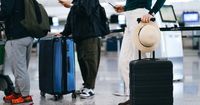As the Easter holidays approach, millions of travelers are gearing up for vacations, but for those who rely on medication, understanding airline policies is crucial to ensure a smooth journey. Whether you're packing pills for a long-haul flight or short getaway, knowing the rules around carrying medication can alleviate travel stress.
All major airlines permit passengers to carry necessary medications, but specific regulations regarding quantities and types of medication do vary. Furthermore, travelers are advised to store enough medication in their cabin bags to cover the flight duration and any potential delays.
Ryanair is one of the most accommodating airlines regarding medication. Passengers are allowed to bring essential medical equipment and medications on board free of charge in addition to their small personal bag, subject to pre-clearance by the airline's Special Assistance Team. According to the Daily Record, Ryanair permits passengers to carry as much liquid medicine as needed for the duration of the flight without requiring the medication to fit into the transparent bags designated for other liquids, as long as they are ready for inspection at airport security.
Ryanair advises that if a passenger needs to bring or use a special medical item onboard, they should contact the airline in advance to obtain the necessary authorization.
Similarly, easyJet has specific guidelines to help travelers managing health conditions. According to easyJet’s policy, passengers should ideally pack their medications in their hand luggage to have them easily accessible during the flight. If medication is placed in hold luggage, there is no requirement for a doctor’s letter or authorization. However, travelers must consult their doctor or pharmacist if their prescription contains controlled drugs such as Diazepam, Lorazepam, Codeine, or Tramadol. Proof of ownership of such medications is crucial, suggesting that passengers carry either a prescription or a doctor’s letter.
A doctor’s letter is required by easyJet if travelers intend on bringing aboard liquids exceeding 100ml, sharp objects like needles, or any medical equipment considered dangerous goods. This ensures compliance with safety regulations while allowing travelers to stay prepared.
TUI has similar requirements for those hoping to carry medication or medical equipment onto the aircraft. Passengers are required to bring along a doctor’s letter or a prescription confirming that the medication belongs to them and that the equipment is essential for the flight. If a passenger wishes to bring liquid medication over 100ml, a doctor’s letter will exempt them from normal security limitations regarding liquids.
Furthermore, medications housed in hold luggage under TUI should be packed separately in a bag that won't count toward the standard cabin baggage allowance, but must still adhere to size restrictions. For insulin or pen injection devices, passengers can carry these in their hand luggage without needing a medical certificate, but they must declare them at check-in. It's also wise to pack insulin in cabin baggage to avoid potential inactivation from low temperatures found in the aircraft's hold.
Jet2 follows a similar routine. Passengers can take essential medications in their hand luggage; however, if the medication exceeds 100ml, a doctor’s letter must accompany it, and it should remain in its original container. Travelers are also asked to declare needles, syringes, and insulin pens to security personnel and cabin crew during their journey.
Jet2 encourages travelers to carry enough essential medications for the entire trip within their hand luggage. These should be clearly labeled with the passenger's full name, healthcare provider’s name, generic and brand name, as well as exact dosage, ensuring clarity at all times.
In light of the upcoming travel season, it’s recommended that all passengers remain informed about the respective airline guidelines and embassy regulations regarding medication. This can usually be achieved by visiting the embassy's website pertaining to the destination country to comply with their medication regulations.
Additionally, travelers should note that airport security personnel may need to open containers to screen liquids at security checkpoints, and medical equipment undergoes separate screening. Preparation and knowledge of these rules can take the stress out of air travel.
This Easter, whether it’s a sun-soaked escapade abroad or an exciting adventure with family, putting forward a little extra effort to ensure medication follows you safely can significantly improve the experience.
The essential takeaway for anyone traveling this season is straightforward: always carry copies of prescriptions or a letter from your doctor detailing the necessity of your medications. This makes the process of traveling with required medications smoother and less fraught with worry.





